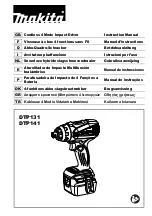
4
EN
WWW.VONROC.COM
1. SAFETY INSTRUCTIONS
Read the enclosed safety warnings, the additional
safety warnings and the instructions. Failure to
follow the safety warnings and the instructions may
result in electric shock, fire and/or serious injury.
Save the safety warnings and the instructions for
future reference.
The following symbols are used in the user manual
or on the product:
Read the user manual.
Denotes risk of personal injury, loss of life
or damage to the tool in case of nonobser-
vance of the instructions in this manual.
Risk of electric shock.
Variable electronic speed.
Rotation, left/right.
Do not use in rain.
Indoor use only.
Class II machine - Double insulation – You
don’t need any earthed plug.
Time-lag miniature fuse-link.
Max temperature 45⁰C.
Do not throw the battery into fire.
Do not throw the battery into water.
Wear eye protection.
Wear hearing protection.
Do not dispose of the product in unsuitable
containers.
Separate collection for Li-ion battery.
The product is in accordance with the
applicable safety standards in the European
directives.
GENERAL POWER TOOL SAFETY WARNINGS
WARNING! Read all safety warnings and all
instructions.
Failure to follow the warnings
and instructions may result in electric
shock, fire and/or serious injury.
Save all warnings and instructions for future
reference.
The term “power tool” in the warnings refers
to your mains-operated (corded) power tool or
battery-operated (cordless) power tool.
1) Work area safety
a)
Keep the work area clean and well lit.
Cluttered
or dark areas invite accidents.
b)
Do not operate power tools in explosive atmos
pheres, such as in the presence of flammable
liquids, gases or dust.
Power tools create
sparks which may ignite the dust or fumes.
c)
Keep children and bystanders away while oper
ating a power tool.
Distractions can cause you
to lose control.
2) Electrical safety
a)
Power tool plugs must match the outlet. Never
modify the plug in any way. Do not use any
adapter plugs with earthed (grounded) power
tools.
Unmodified plugs and matching outlets
will reduce risk of electric shock.
b)
Avoid body contact with earthed or grounded
surfaces, such as pipes, radiators, ranges and
refrigerators.
There is an increased risk of elec-
tric shock if your body is earthed or grounded.
c)
Do not expose power tools to rain or wet condi
tions.
Water entering a power tool will increase
the risk of electric shock.
d)
Do not abuse the cord. Never use the cord for
carrying, pulling or unplugging the power tool.
Keep cord away from heat, oil, sharp edges
or moving parts.
Damaged or entangled cords
increase the risk of electric shock.
e)
When operating a power tool outdoors, use an
extension cord suitable for outdoor use.
Use of
a cord suitable for outdoor use reduces the risk
of electric shock.
f)
If operating a power tool in a damp location
is unavoidable, use a residual current device
(RCD) protected supply.
Use of an RCD reduces
the risk of electric shock.



































